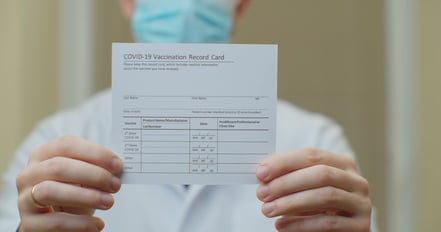***IMPORTANT UPDATE: OSHA has suspended activities related to the implementation and enforcement of the Emergency Temporary Standard (ETS) pending future developments. The announcement is a result of the Fifth Circuit’s opinion which continues the stay of the ETS. As the future of the ETS currently remains uncertain, please stay up to date with the latest developments.
On Nov. 4, 2021, the U.S. Department of Labor’s Occupational Safety and Health Administration (OSHA) issued an ETS for Covid-19 Vaccination and Testingto minimize the risk of COVID-19 transmission in the workplace. Here is a summary of important requirements.
Summary of New ETS Mandates
Under the new ETS, private employers with 100 or more employees are required to have all employees vaccinated must also ensure that their employees have received all of the necessary shots by the deadline. Unvaccinated employees are also required to produce negative Covid tests on a weekly basis.
Understand the Definition of Covered Employer. If your business falls within the scope of the ETS 100-employee threshold on the effective date,  Nov. 5, 2021, then the ETS applies for the duration of the standard. The 100 employee count must be conducted at the employer level and does not apply at the individual location. For example, if a business has multiple locations, all employees at all locations are included in the total count. For information about other situations, such as multi-employer worksites and remote worker, visit OSHA's ETS site at www.osha.gov/coronavirus/ets2/faqs.
Nov. 5, 2021, then the ETS applies for the duration of the standard. The 100 employee count must be conducted at the employer level and does not apply at the individual location. For example, if a business has multiple locations, all employees at all locations are included in the total count. For information about other situations, such as multi-employer worksites and remote worker, visit OSHA's ETS site at www.osha.gov/coronavirus/ets2/faqs.
Create a Written Employer Vaccination Policy. The ETS requires covered employers to develop, implement, and enforce a mandatory Covid-19 vaccination policy for all employees or a policy that allows employees to elect between vaccination or providing required proof of regular Covid-19 testing and wearing a face covering while at the workplace.
Determine Employee Vaccination Status. Covered employers must track each employee's vaccination status (partial, full, or unvaccinated), obtain acceptable proof of that status, and maintain records and a roster of each employee’s status.
Employers must also ensure that each employee, not fully vaccinated, be tested for Covid-19 on a weekly basis if the employee is in the workplace at least once a week. If the employee is away from the workplace for a week or longer, then the employee must be tested within seven days before allowed to return to work.
 Employers are required to keep a record of each Covid test result. The test results are considered employee medical records, covered under OSHA’s Access to Medical Records standard, and must be kept during the duration of the ETS. The medical records can only be disclosed as required under the ETS or other federal law, including the Americans with Disabilities Act (ADA).
Employers are required to keep a record of each Covid test result. The test results are considered employee medical records, covered under OSHA’s Access to Medical Records standard, and must be kept during the duration of the ETS. The medical records can only be disclosed as required under the ETS or other federal law, including the Americans with Disabilities Act (ADA).
The ETS does not require employers to pay for costs associated with testing. However, employers may be required to cover testing under other laws, regulations, or other collective bargaining and negotiated agreements.
Review Acceptable Methods of Proof of Vaccination Status. Under the ETS, acceptable methods of proof of vaccination status include:
- Immunization record from a health care provider or pharmacy
- U.S. Covid-19 Vaccination Record Card
- Medical records documenting the vaccination
- Immunization records from public health, state, or tribal immunization information system
- Other types of official documents verify the date, location, and type of vaccine received
Reporting Covid-19 Fatalities and Hospitalizations to OSHA. The ETS requires employers to report work-related Covid-19 fatalities to OSHA within 8 hours of the incident and work-related Covid-19 in-patient hospitalizations within 24 hours.
Make Records Available. The ETS requires employers to provide employees with vaccine documentation and related test results and the total number of employees, including the total of fully vaccinated employees, at the workplace.
Understand Requirements for Paid Time-Off for Vaccinations and Testing. Under the ETS, employers must provide employees up to four hours of paid time off in order to receive each dose of the vaccine, in addition to reasonable time and paid sick leave to recover from any side effects. Employers are not required to provide paid time off to employees who receive a positive test result. However, it may be required under state and other laws.
Review Requirements for Face Coverings. The ETS requires employers to ensure that employees, who are not fully vaccinated, wear a face covering when indoors or in a vehicle with another person for work-related purposes, except in certain circumstances. In addition, employers must not prevent any employee, regardless of vaccination status, from voluntarily wearing a face-covering unless it creates a serious workplace hazard. The ETS does not require employers to pay for face coverings, but employers may be required to pay under other applicable laws.
in a vehicle with another person for work-related purposes, except in certain circumstances. In addition, employers must not prevent any employee, regardless of vaccination status, from voluntarily wearing a face-covering unless it creates a serious workplace hazard. The ETS does not require employers to pay for face coverings, but employers may be required to pay under other applicable laws.
Distribute Required Information to Employees. Under the ETS, employers must provide employees with the following information:
- Requirements of the ETS and workplace policies and procedures established to implement the ETS
- CDC document “Key Things to Know About Covid-19 Vaccines"
- Information about protection against retaliation and discrimination
- information about laws and criminal penalties for knowingly supplying false statements or documentation
Keep Your Workplace Safe
Because OSHA may revise or update the ETS as the pandemic continues to evolve, it's important to consult your legal counsel and HR advisors to understand your responsibilities and how it applies to your business. In addition, it’s important for all employers to stay up to date on any new developments, resources, and changes that may impact workplace safety.
For more information and the full text of the new OSHA Vaccination and Testing ETS, visit www.osha.gov/coronavirus/ets2.
PLEASE NOTE: This information is for general reference purposes only. As we continue to work during the pandemic, laws, regulations, and filing deadlines are likely to change. Please check with the appropriate organizations or government agencies for the latest information and consult your employment attorney and/or benefits advisor regarding your responsibilities. In addition, your company may be exempt from certain requirements and/or be subject to different requirements under the laws of your state. (Updated Dec. 6, 2021)
About Propel HR. Propel HR is an IRS-certified PEO that has been a leading provider of human resources and payroll solutions for more than 25 years. Propel partners with small to midsized businesses to manage payroll, employee benefits, compliance and risks, and other HR functions in a way that maximizes efficiency and reduces costs. Visit our new website at www.propelhr.com.











